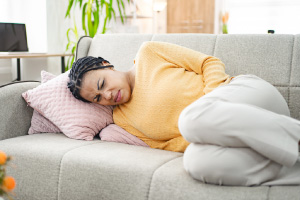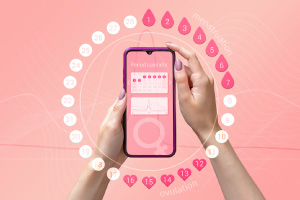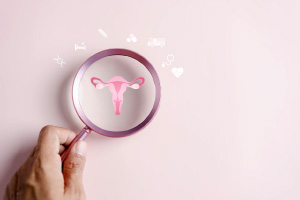Tips & Facts on Managing Your Menstruation Cycle with Ease
Menstruation is the monthly bleeding that occurs when the uterine lining is shed. It’s commonly called a period. The menstruation cycle is a vital part of the hormone cycle that regulates the female body. shedding of the uterine lining, resulting in bleeding through the cervix.
Managing the monthly cycle is something each woman does, be it through lifestyle changes, like diet and exercise, or medical prescriptions.
Common PMS Signs:
 Abdominal or pelvic cramping
Abdominal or pelvic cramping- Backache and/or leg pain
- Bloating
- Acne
- Loose stool/diarrhea
- Tender breasts
- Food cravings
- Mood swings including irritability, depression, and anxiety
- Headache and fatigue
Tips on How to Best Deal with Periods
- Light exercises. Low-impact exercises like walking, stretching, or doing yoga can increase blood flow and decrease cramping.
- Eat fresh foods. Eating fresh fruits and vegetables, as opposed to starchy, surgery foods, can alleviate period symptoms.
- Stay hydrated. Drink plenty of water while on your period to eliminate water buildup in the body.
- Get your sleep. Getting enough sleep helps the body recover and leaves you feeling refreshed upon waking.
- Limit caffeine consumption. Caffeine can make you retain water and leave you feeling bloated and crampy. A good substitute is herbal tea, water, dark chocolate, or ginger.
When is the First Day of the Period?
Start counting on the first day that you experience full flow, not light spotting.
What is a “Bad” Period Cycle?
A period cycle can be considered “bad” when it varies from the normal day range for a woman’s age. If a period stops for more than 90 days or occurs more than 35 days from the prior period, it’s a problematic sign.
Periods that are less than 21 days or three weeks apart from one another are another sign of a bad period.
Some of the signs to consider include the flow or whether or not the period is heavier than normal. You might be using one or more pads every one to two hours. Another sign is severe cramping or pain during or before a period. Be watchful of bleeding between periods or irregular periods that are accompanied by excessive facial hair growth, or hair growth on the abdomen or chest.
When is a Period Considered Late?
 7 days past the due date.
7 days past the due date.
Keep in mind that a period can stop for any number of reasons:
- Lifestyle stressors
- Menopause
- Birth control pills
- Strenuous exercise or drastic weight changes
- Polycystic ovary syndrome (PCOS) or thyroid imbalances
- Genetic factors
Characteristics of a Healthy Period Cycle:
Timing a healthy period cycle: 21 - 35 days, and an average of 28 days between the first period’s start date to the next. Cycles can become irregular due to other life events that affect hormones, like menopause, childbirth, or during periods of breastfeeding.
Pain during a period cycle: mild or moderate cramping is perfectly normal. Pain shouldn’t be excessively painful. If it is, contact a health provider immediately.
Bleeding on a period cycle: This can last 3 to 7 days, and the blood color varies from bright red to dark brown or black. A brighter red color is seen at the beginning because it’s the freshest blood. A darker red color occurs after blood has been exposed to oxygen. Frequent, excessive bleeding isn’t normal, and help should be sought out immediately if you have this issue.
Mood swings during a period cycle: some mood changes are normal. However, dramatic changes in mood aren’t a healthy sign. If you’re experiencing sadness, anxiety, or excessive fatigue, it may indicate conditions like premenstrual dysphoric disorder (PMDD).
Do Medications Affect Menstrual Cycle?
 Yes. Prescription medications, like birth control meds, and over-the-counter drugs can affect the interplay of hormones occurring during a menstrual cycle, thus impacting the flow and duration of the period.
Yes. Prescription medications, like birth control meds, and over-the-counter drugs can affect the interplay of hormones occurring during a menstrual cycle, thus impacting the flow and duration of the period.
If you’re using medications, it’s important to discuss any changes you’ve been experiencing with a licensed healthcare provider.
Why Do Shortening Menstrual Cycles Occur?
A shortening menstrual cycle can occur due to a variety of reasons:
- High levels of stress
- Sudden weight loss
- Excessive, strenuous exercise
- Dietary changes
Menstrual cycles will often shorten with age. In a woman’s 40s, the ovaries slow estrogen production, leading to shorter and fewer periods.
Menstrual Cycle Phases Explained
 Menstrual Phase: 3 to 7 days where the uterine lining (endometrium) is shed through the vagina, resulting in bleeding.
Menstrual Phase: 3 to 7 days where the uterine lining (endometrium) is shed through the vagina, resulting in bleeding.- Follicular phase: 10 to 14 days. Starts on the first day of menstruation and progresses until ovulation. The pituitary gland releases follicle-stimulating hormone (FSH) that grows the ovarian follicles (which contains an egg).
- Ovulatory phase: Occurs on the 14th day in a 28-day cycle (the exact day will vary considerably). The middle of the cycle where fertility spikes and the ability to conceive is high.
- Luteal phase: 14 days. After the egg is released, the follicle transforms into the corpus luteum, secreting estrogen and progesterone, hormones that prepare the uterus’s lining for potential pregnancy.
Are the Moon’s Phases and Your Menstrual Cycle Connected?
This is a fairly common question that young women ask. Some studies have shown that the moon phase and menstrual cycle are relatively synced. However, there is no conclusive scientific evidence that lunation phases and women’s menstrual cycles are connected.
Find an OB/GYN in Kansas City Today
At Northland Women’s Health Care, we cover all areas of women’s health and wellness. If you’re looking for pregnancy-related guidance or general help with your health and wellness goals, start by getting in contact with one of our health specialists. Call today to set up your first appointment: 816-741-9122.
